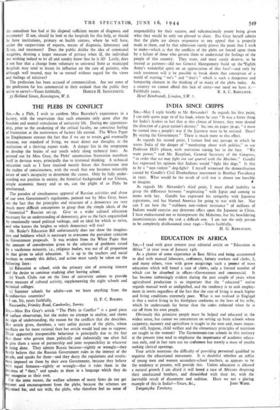Sta,—Miss Era Gray's article " The Plebs in Conflict "
is a good piece of surface observation, but she makes no attempt to analyse, and shows no sign of understanding, the reason for the conflicts that she describes. Her article gives, therefore, a very unfair picture of the plebs, whose conflicts are far more rational than her article would lead one to suppose.
Their apparently irresponsible behaviour is principally due to the fact that those who govern them politically and industrially too often fail to give them a sense of partnership and joint responsibility in whatever is being done. They admire Russia because—rightly or wrongly—they firmly believe that the Russian Government rules in the interest of the People, and speaks for them—and they decry the regulations and restric- • non' imposed on them by their own Government, because they believe With equal firmness—rightly or wrongly—that it rules them in the interests of " they," and speaks to them in a language which they do not recognise as their own.
For the same reason, the welfare schemes of many firms do not get support and encouragement from the plebs, bedause the schemes are organised for, and not with, the plebs, who therefore feel no sense- or
responsibility for their success, and subconsciously resent being given what they would be only too pleased to share. Era Gray herself admits that the plebs are always responsive to any appeal that is properly made to them, and by that admission surely proves the point that I wish to make—which is that the conflicts of the plebs are forced upon them by a failure of those who govern them to understand the feelings of the people of this country. They want, and most surely deserve, to be treated as partners—did not General Montgomery build up the 'Eighth Army's wonderful spirit on an appreciation of that fact?—and only by such treatment will it be possible to break down that conception of a world of warring " we's " and " they's " which is such a dangerous and hampering element in the thinking of so many of the plebs today. As a country we cannot afford this lack of unity—nor need we have it.—
Faithf ully yours, R. A. C. RADCLIFFE. Hotel Rembrandt, London, S.W. 7.


























 Previous page
Previous page